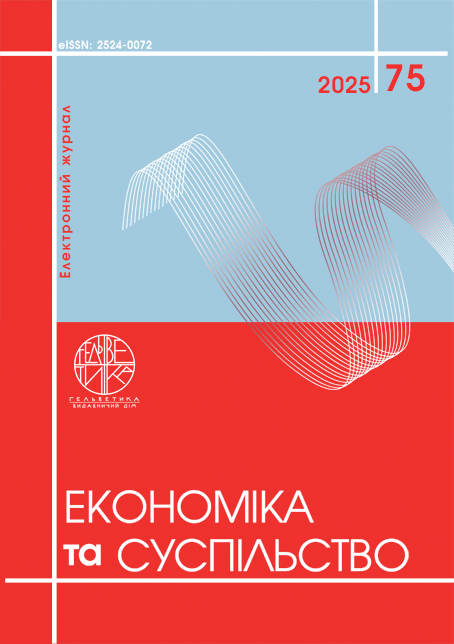ЖИВА ІСТОРІЯ У КОНТЕКСТІ СТАЛОГО ТУРИЗМУ ТА ЗБЕРЕЖЕННЯ КУЛЬТУРНОЇ СПАДЩИНИ
Анотація
Метою статті є обґрунтування важливості живої історії як інструменту збереження культурної спадщини в умовах розвитку сталого туризму, з акцентом на її освітній, емоційний та культуроохоронний потенціал. Об’єктом дослідження виступає феномен живої історії у форматах історичної реконструкції, історичної анімації, майстер-класів та фестивального туризму. У статті обґрунтовано значущість живої історії як сучасного інтегрованого підходу до збереження культурної спадщини в контексті сталого туризму. Визначено, що жива історія включає такі основні форми, як історична реконструкція, історична анімація, майстер-класи з традиційних ремесел, театралізовані дійства та фестивальний туризм, які не лише урізноманітнюють відпочинок, а й сприяють формуванню глибокого емоційного зв’язку туристів із культурною спадщиною. Доведено, що активне залучення туристів до історичних активностей виступає ефективним інструментом передачі нематеріальної спадщини та формування усвідомленої мотивації до її збереження.
Посилання
Соловій І.П., Адамовський О.М., Дубовіч І.А. Сталий туризм: сучасний стан та перспективи розвитку в Україні. Економіка та суспільство. 2023. Вип. 50. DOI: https://doi.org/10.32782/2524-0072/2023-50-79 (дата звернення 17.06.2025)
Шуптар-Пориваєва Н.Й., Губанова О.Р., Попова М.О., Андрущенко О.С. Перспективи інноваційного розвитку туристичної сфери в Україні в умовах коронавірусної кризи. Соціально-економічні проблеми сучасного періоду України. 2020. Вип. 6. С. 90–96.
Гапоненко Г., Євтушенко О., Шамара І. Пріоритетні напрями забезпечення сталого розвитку туризму України в умовах пандемії. Бізнес Інформ. 2021. № 5. C. 227–235.
Мелько Л.Ф. Туризм у контексті сталого розвитку. Вчені записки Університету «КРОК». 2017. Вип. 48. С. 190-197.
Джинджоян В.В., Тесленко Т.В., Горб К.М. Інноваційні технології в туризмі та гостинності: навчальний посібник. Київ: Видавництво «Каравела», 2022. 340 с.
Шандор Ф.Ф., Кляп М.П. Сучасні різновиди туризму: підручник. Київ: Знання, 2013. 334 с.
Голод А.П. Безпека регіональних туристичних систем: теорія, методологія та проблеми гарантування: монографія. Львів: ЛДУФК, 2017. 340 с.
Новицька С.Р. Екологічний туризм як пріоритетний напрямок сталого розвитку туристичної сфери. Наукові записки Тернопільського національного педагогічного університету імені Володимира Гнатюка. Сер. : Географія. 2013. № 2. С. 164–169.
Штангрет А., Силкін О., Шляхетко В. Трудова міграція як зовнішня загроза для кадрової безпеки підприємства. № 10(38), 2024. Наукові інновації та передові технології. С. 190-201. https://doi.org/10.52058/2786-5274-2024-10(38)-190-201 (дата звернення: 29/05/2025)
Штангрет А., Силкін О. Безпекові аспекти управління персоналом в умовах гіпердинамічного зовнішнього середовища. № 9(37), 2024. Наукові інновації та передові технології. С. 227-237. https://doi.org/10.52058/2786-5274-2024-9(37)-227-237 (дата звернення: 30/05/2025)
Solovii, I. P., Adamovskyi, O. M., & Dubovich, I. A. (2023). Stalyi turyzm: suchasnyi stan ta perspektyvy rozvytku v Ukraini [Sustainable tourism: current state and development prospects in Ukraine]. Ekonomika ta suspilstvo – Economy and Society, (50). https://doi.org/10.32782/2524-0072/2023-50-79 [in Ukrainian].
Shuptar-Poryvaieva, N. Y., Hubanova, O. R., Popova, M. O., & Andrushchenko, O. S. (2020). Perspektyvy innovatsiinoho rozvytku turyzmu v Ukraini v umovakh koronavirusnoi kryzy [Prospects for innovative development of tourism in Ukraine under the coronavirus crisis]. Sotsialno-ekonomichni problemy suchasnoho periodu Ukrainy – Socio-Economic Problems of the Modern Period of Ukraine, (6), 90–96 [in Ukrainian].
Haponenko, H., Yevtushenko, O., & Shamara, I. (2021). Priorytetni napriamy zabezpechennia staloho rozvytku turyzmu Ukrainy v umovakh pandemii [Priority directions for ensuring sustainable tourism development in Ukraine under the pandemic]. Biznes Inform – Business Inform, (5), 227–235 [in Ukrainian].
Melko, L. F. (2017). Turyzm u konteksti staloho rozvytku [Tourism in the context of sustainable development]. Vcheni zapysky Universytetu “KROK” – Scientific Notes of KROK University, (48), 190–197 [in Ukrainian].
Dzhindzhoian, V. V., Teslenko, T. V., & Horb, K. M. (2022). Innovatsiini tekhnolohii v turyzmi ta hostynnosti: navchalnyi posibnyk [Innovative technologies in tourism and hospitality: Textbook]. Kyiv: Karavela [in Ukrainian].
Shandor, F. F., & Kliap, M. P. (2013). Suchasni riznovydy turyzmu: pidruchnyk [Modern types of tourism: Textbook]. Kyiv: Znannia [in Ukrainian].
Holod, A. P. (2017). Bezpeka rehionalnykh tury stychnykh system: teoriia, metodolohiia ta problemy harantuvannia: monohrafiia [Security of regional tourism systems: theory, methodology and guarantee issues: Monograph]. Lviv: LDUFK [in Ukrainian].
Novytska, S. R. (2013). Ekolohichnyi turyzm yak priorytetnyi napriamok staloho rozvytku tury stychnoi sfery [Ecological tourism as a priority direction of sustainable development in the tourism sector]. Naukovi zapysky Ternopilskoho natsionalnoho pedahohichnoho universytetu imeni Volodymyra Hnatiuka. Ser.: Heohrafiia – Scientific Notes of Ternopil National Pedagogical University named after Volodymyr Hnatiuk. Series: Geography, (2), 164–169 [in Ukrainian].
Shtangret, A., Sylkin, O., & Shliakhetko, V. (2024). Trudova mihratsiia yak zovnishnia zahroza dlia kadrovoi bezpeky pidpryiemstva [Labour migration as an external threat to the personnel security of the enterprise]. Naukovi innovatsii ta peredovi tekhnolohii, (10(38)), 190–201. https://doi.org/10.52058/2786-5274-2024-10(38)-190-201 [in Ukrainian].
Shtangret, A., & Sylkin, O. (2024). Bezpekovі aspekty upravlinnia personalom v umovakh hiperdynamichnoho zovnishnoho seredovyshcha [Security aspects of personnel management in a hyperdynamic external environment]. Naukovi innovatsii ta peredovi tekhnolohii, (9(37)), 227–237. https://doi.org/10.52058/2786-5274-2024-9(37)-227-237 [in Ukrainian].

Ця робота ліцензується відповідно до Creative Commons Attribution 4.0 International License.


